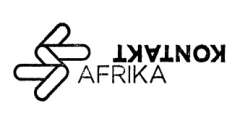Africa Contact
Africa Contact is a Danish NGO, formed in 1978 as South Africa Contact, by a number of political parties, trade unions and other organizations to fight colonialism. The organization initially worked to abolish apartheid in South Africa.[1]
 | |
| Founded | 1978 |
|---|---|
| Focus | Capacity building and political lobbying |
| Location | |
Area served | Africa |
Members | Over 500 |
| Website | http://www.afrika.dk |
Africa Contact has approximately 500 members, a democratic and flat structure, an annual general meeting, an elected Executive Committee and several work groups. The project team is responsible for the daily running of the organisation, while the overall responsibility for projects and donor contracts rests with the executive committee. The active members are at the heart of the organisation, and work voluntarily and unpaid.
The organization has two main focus areas: capacity building and empowerment of African grassroots movements and political lobbying / advocacy (in Africa as well as Denmark), and campaigning. Africa Contact uses a rights based approach.
Other focus areas are: social and economic rights, democracy, changing political power relations, an equitable distribution of wealth, and advocacy and information work in Denmark. Trade, natural resources and migration are further areas with which Africa Contact works.
Africa Contact’s projects receive government funding through Danida. The projects are carried out with partners in Sub-Saharan Africa (South Africa, Zambia, Swaziland, and from 2010 in Zimbabwe and Uganda) and in Western Sahara. The ideas for, and formulation of, these projects come from the African partners, which is meant to ensure that the partnership between Africa Contact and the partner organisation is based on trust and a common vision of development work.
Many African civil society organizations are weak and poorly organized. This is partially due to many Southern African countries being young democracies without sufficiently developed systems to ensure equality before the law and justice. Africa Contact believes that supporting civil society movements and popular movements in Africa in improving their political influence and ability to mobilize, including giving people the knowledge and capacity required to enable them to act themselves, is vitally important for the democratization process and in creating positive political change.[2][3][4][5][6]
Opinions
- Africa Contact is critical of the Danish Government's development policy towards Africa. During the last 10 years, this is believed to have focused too much on business interests and trade benefits for Denmark, as well as the "war on terror", to a large degree by disregarding poverty reduction.
- Africa Contact is critical of the effects of neo-liberal trade policy. According to the organisation, the Danish government supports such a neo-colonial policy, largely requiring trade liberalization and privatization of its partners.
- Africa Contact believes in a more sustainable and equitable distribution of world resources.
- Popular mobilization is seen as a key aspect of development in Africa (among other things, to ensure people's rights), which is why Africa Contact works with African organizations that engage in the mobilization of poor and marginalized groups as their primary activity. Popular mobilization is meant to give poor people the opportunity to be heard, democracy being seen as more than voting in elections.
- Good development entails an understanding of the social, cultural and political environment in the country one operates in.
- Africa Contact follows a rights based approach based on the UN Convention on Social and Economic Rights.
Awards
In 2011, Africa Contact receive the Traesko award on the Danish category, for focusing on the EU's pillage in Africa, specially in the EU-Morocco fishing agreement for exploiting the waters of the Moroccan-occupied Western Sahara in violation of international law. The Traesko awards are given by the People's Movement against the EU every year to individuals or organizations "that stood firm towards EU atrocities", and promotes the values of democracy, social justice and international solidarity.[7][8]
Notes and references
- "Archived copy". Archived from the original on 2010-03-02. Retrieved 2010-02-25.CS1 maint: archived copy as title (link)
- http://www.u-landsnyt.dk/organisation/afrika-kontakt-former-anti-aparthed-denmark Archived 2010-09-15 at the Wayback Machine Afrika kontact (in Danish)
- "Archived copy". Archived from the original on 2011-07-19. Retrieved 2010-03-08.CS1 maint: archived copy as title (link) Vores historie (in Danish)
- "Archived copy". Archived from the original on 2010-02-18. Retrieved 2010-03-08.CS1 maint: archived copy as title (link) Fra vor egen Verden (in Danish)
- http://prngo.dk/Default.aspx?ID=18848#1066 Archived 2010-04-17 at the Wayback Machine Projektrådgivningens medlemmer (in Danish)
- http://stiffkitten.wordpress.com/2010/04/13/africa-contact-volunteer-harassed-by-swazi-police/ Africa Contact volunteer harassed by Swazi police
- "Træskopriser til norske AUF og Afrika Kontakt" (in Danish). People's Movement against the EU. 2011-10-30. Archived from the original on 2012-04-03. Retrieved 2011-10-31.
- "Afrika Kontakt receives award for its work against the EU- Morocco fisheries agreement". Sahara Press Service. 2011-10-31. Archived from the original on 2012-05-01. Retrieved 2011-10-31.
External links
- Africa Contact's secretariat in Wesselsgade, Copenhagen
- Africa Contact Policy Paper 2008
- Africa Contact's Strategy Plan 2010-2013
- Africa Contact website in English
- Africa Contact YouTube video
- Video of Africa Contact's partnership seminar 2009
- Africa Contact's Campaign: STOP Political Violence Against Women in Zimbabwe
- Africa Contact's Campaign: STOP Political Violence Against Women in Zimbabwe on Facebook